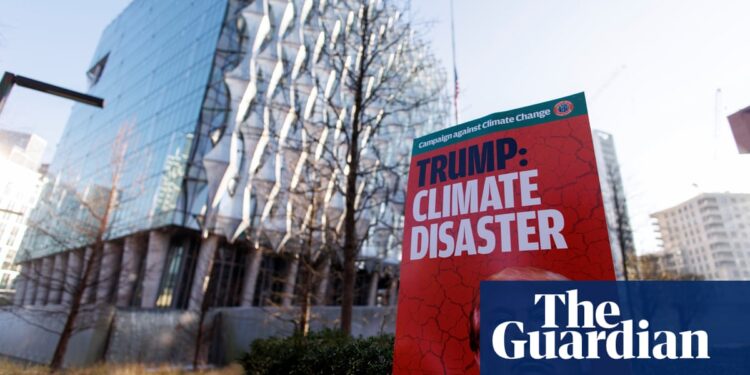Donald Trump’s new administration confirmed on Monday on his first day in office that he will repeat his first-term move and pull the world’s second biggest emitter of planet-heating pollution out of the 2015 Paris agreement, the global treaty seeking to avoid the worst impacts of the climate crisis.
The confirmation was in a White House document entitled President Trump’s America First Priorities, in a package of measures under the headline “Make America affordable and energy dominant again”.
When enacted, the US will join Iran, Libya and Yemen as the only countries outside the global agreement, which Joe Biden had rejoined in 2021 after Trump confirmed he would exit it in his first term in 2017.
Trump has also pledged to reverse Biden’s efforts to grow the US’s clean energy sector, which Trump describes as “the green new scam”, promising in his inauguration address to “drill baby drill” and remove all limits on America’s booming fossil fuel industry.
The fossil fuel industry is expected to expand further during Trump’s second presidency despite already producing record amounts of oil, and the US becoming the world’s biggest producer of gas, and while under Biden a record 758 oil and gas drilling licenses were issued in 2023.
One estimate before Trump won last November’s election calculated his return to the White House could add 4bn tonnes to US emissions by 2030.
Gina McCarthy, a former EPA Administrator under Barack Obama, said that Trump “abdicated” his responsibility to Americans by leaving the Paris accord.
“The United States must continue to show leadership on the international stage if we want to have any say in how trillions of dollars in financial investments, policies, and decisions are made that will shape the course of our economy and the world’s ability to fight climate change,” she said in a statement.
Because of the complicated rules about leaving the Paris accord, the first time Trump pulled the US out of the agreement there was a substantial delay between the decision, announced in June 2017, and official withdrawal, which was not until November 2020.
In the weeks before Trump’s inauguration, the outgoing Biden administration formally filed new plans under the Paris agreement for tougher 2035 emissions targets for the US, intended as a “capstone” on his legacy on the climate, which included the landmark clean energy investment in the Inflation Reduction Act of 2022.
Under Biden’s new target, the US would have had to cut greenhouse gases by between 61% and 66% by 2035, compared with 2005 levels – a substantial strengthening of current goals that administration officials said would put the US on the path to net zero carbon by 2050.
At the time the Biden targets were announced in mid-December last year, mindful that Trump would not adhere to them, John Podesta, who was senior adviser for international climate policy, said: “Sub-national leaders across the US can continue to show the world that US climate leadership is determined by so much more than who sits in the Oval Office.”
Basav Sen, a director at the left-leaning thinktank Institute for Policy Studies, said though he believes the Paris agreement is inadequate to limit global warming, Trump exiting it is “reprehensible”.
“He and his administration do not care about cooperative global action to avert climate catastrophe, and want to recklessly expand fossil fuel production,” he said.
The fossil fuel industry donated $75m to Trump’s campaign.
Climate advocates hope cities and leaders across the US will continue to push the clean energy transition, with Republican districts benefitting most from the IRA investment, and cleaner energy, particularly solar, being cheaper than dirty energy like coal.
“[R]est assured, our states, cities, businesses, and local institutions stand ready to pick up the baton of US climate leadership and do all they can – despite federal complacency – to continue the shift to a clean energy economy,” said McCarthy, who is now managing co-chair of America Is All In, a coalition of climate-concerned American leaders.
In November 2025, world leaders will meet in Brazil for a global UN summit, which is likely to be the last chance for the world to forge a global plan to prevent temperatures reaching 1.5C above pre-industrial levels. Experts say fossil fuel emissions must be cut quickly and deeply to avoid the worst outcomes including more extreme weather, sea level rise, biodiversity loss, food and water insecurity and worsening health impacts.
Paul Bledsoe, a former Clinton White House climate official who now lectures at American University’s Center for Environmental Policy, speaking at the time of the Biden targets being announced in December last year, said: “Trump is risking the climate stability and safety of the planet as part of a culture war political strategy, heedless of billions who will suffer.”
Trump’s announcement confirming he will quit the Paris agreement comes days after the outbreak of devastating wildfires in Los Angeles, the latest in a growing series of extreme weather disasters linked to the climate crisis. Experts have described how the fires are linked to unprecedented compounding climate conditions of extreme hurricane winds, drought and relatively high temperatures in January. They have caused at least 25 deaths and as much as $250bn of dollars of damage. Trump used the disaster to spread disinformation and stoke political division.






